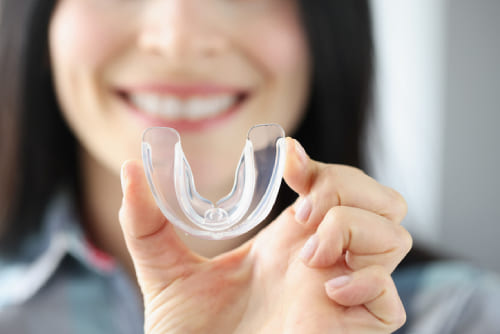Navigation
Mouthguards and braces: what you need to know
Whether you’re involved in friendly games, more professional matches or simply want to try something new, it’s important that you enjoy sports safely. When you have braces, there’s plenty to keep in mind when undertaking sporting activities - not least how to keep your smile protected and safe from potential injury.
Having braces shouldn’t stop you from being active in sports. With a custom mouthguard (sometimes called a gumshield), you’ll be able to keep your smile safe when you’re scoring tries, mountain biking, horse riding and much more. Let’s take a closer look at mouthguards and braces, and answer some of the questions our orthodontist team is frequently asked.

What is a mouthguard?
Mouthguards are simple cushioning devices made from flexible materials which snugly fit over the teeth, protecting them from impactive injuries and accidents. They’re essentially a crash helmet for your teeth, which also stop the jaws from coming together and causing jaw joint injuries, sudden tooth impacts and even concussion.
While regular mouthguards tend to come in ‘one-size-fits-all’ styles, orthodontic mouthguards need to fit well and be reshapable, allowing them to be reformed to fit snugly as your braces straighten your teeth. Due to the wires (and greater surface area) used in braces, off-the-shelf mouthguards with gel fillings aren’t suitable for those undergoing orthodontic treatment.
Should I use a mouthguard when wearing braces?
Injuries to the jaw, mouth and teeth are some of the most common that occur when taking part in sports. Interestingly, wearing braces can actually protect your teeth from being displaced or lost if you suffer a significant facial or mouth injury. For common or less severe impactive injuries, mouthguards will still protect your teeth while wearing braces.
What’s more, being hit in the face by a bat, a ball, a team mate’s elbow or anything else while wearing braces without a mouthguard can cause injury or lacerations to the cheeks, lips and tongue. A mouthguard will also protect the brackets and wires of the braces from any strike to the face, ensuring play can continue along with your teeth straightening journey.
When do I need a special mouthguard for braces?
Ask any sportsperson, and they’ll be sure to tell you that mouthguards are one of the most important items of protective equipment while on the field. We’d always encourage our patients to err on the side of caution when playing sports while wearing braces, but there are some activities where a mouthguard becomes an absolutely crucial bit of kit.
The general rule of thumb is that you should use a mouthguard while wearing braces for any and all activities that would normally call for a mouthguard, namely for contact sports like rugby, football, hockey and basketball. However, they’re also highly recommended for activities where bumps and falls are not uncommon, such as skateboarding, skating, climbing and horse riding.
If boxing, martial arts or other contact activities are your preferred sport of choice, then it may be worth asking about double mouthguards - those which fit to your top and bottom teeth.
Are mouthguards worn over braces?
When you have fixed braces, you’ll have to wear a custom-made mouthguard to fit the mould of the brackets on your braces to ensure maximum protection. These will likely be crafted from medical-grade silicone or a similar material that will adapt to changes to your mouth structure, allowing you to remain safe while your teeth are straightened.
Our orthodontics team will be happy to guide you through the process of getting a mouthguard made. They’ll let you know how best to use one while playing sports, and when you’ll need to schedule a future appointment to get a new mouthguard made as your bite pattern straightens.
Once you receive your mouthguard, your orthodontist will be able to mould it to fit your braces perfectly. At future appointments, you’ll be able to get your mouthguard refitted. This will allow it to stay comfortable in your mouth, even when your teeth have started moving into their straighter position.
If you’ve opted for Invisalign treatment at Total Orthodontics, you should remove your clear retainers while partaking in sports - just as you would while eating. However, you should ask your orthodontists about options for suitable mouthguards to keep yourself protected, as you don’t want to injure your teeth regardless! The same applies to those wearing retainers following their fixed braces being removed.
Have any questions about teeth straightening? With so many options to choose from, it’s never been easier to discover the ideal braces for your needs and lifestyle.
Our team would love to hear from you and is ready to help you achieve the smile you’ve always wanted. Get in touch today and find out what Total Orthodontics can do for you.